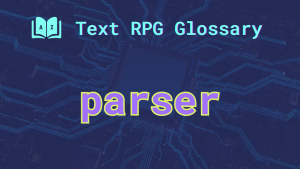What is a parser in text games?

A parser in interactive fiction (IF) is the system that reads and interprets player input, turning it into actions within the game. When you type commands like “open door” or “take lantern,” the parser figures out what you mean and responds accordingly.
More advanced parsers can handle complex instructions, such as “put the book on the table and sit in the chair.” A good parser makes the game feel smooth and immersive, while a clunky one can lead to frustration when it doesn’t understand what you’re trying to do.
Jump to Section
- What is a parser in text games?
- Parser examples
- Common parser myths
- Parser FAQs
- Why won’t the game understand what I type?
- Can I play parser-based games on my phone?
- What’s the difference between a parser and a game engine?
- Are there any modern games that still use parsers?
- How do I get better at playing parser games?
- What are some good parser-based games to start with?
- Will AI improve parsers in the future?
A brief history of the term
The word “parser” comes from computer science, where it refers to software that breaks down and analyzes text or code.
Early text adventures like Colossal Cave Adventure (1976) and Zork (1977) used simple parsers that only recognized basic two-word commands like “get lamp” or “go north.”
As interactive fiction evolved, so did parsers. Later games introduced more sophisticated language processing, allowing players to type longer, more natural commands. Some modern IF engines even use AI-powered parsers to create more dynamic experiences.
One example is AI Dungeon, which uses machine learning to interpret player input in a much more flexible way than traditional parsers. Instead of only recognizing predefined words and phrases, AI Dungeon generates responses dynamically based on the context of the player’s actions. This allows for open-ended storytelling, where players can type almost anything and receive a unique response.
Other AI-assisted IF projects are experimenting with neural networks to make parsers feel more like an actual conversation rather than a strict command system.
Modern usage
Even though graphical games dominate the industry, parser-based interactive fiction is still alive and well. Game development tools like Inform, TADS, and Adventuron make it easy to create new text adventures with powerful parsers.
Parsers are most commonly found in:
- Interactive fiction – Classic text-based storytelling games
- MUDs (Multi-User Dungeons) – Online multiplayer text RPGs
- Roguelikes and RPGs – Some command-driven games incorporate parsers for text commands
- Experimental games – Some indie developers use parsers in unique ways, blending text input with visuals
Parser examples
- You type “examine bookshelf,” and the game responds, “The bookshelf is filled with dusty old tomes. One looks particularly interesting.”
- A basic parser only understands “take sword,” while an advanced one lets you type “pick up the rusty sword from the table.”
- A game with a complex parser allows “give the blue potion to the wizard” instead of just “give potion.”
- If the parser is too rigid, it might reject “climb up the tree” but accept “climb tree.”
- In a MUD, you type “whisper to John ‘Meet me at the tavern,'” and the parser ensures only John sees the message.
Note: In MUDs, it’s much more common to talk about “command syntax” than parsers. Command syntax is the collection of words (and the order they must be in) that the parser will accept. For example, “give 10 dollars to Joe” instead of “give Joe 10 dollars.” Both make sense in English, but the game might only accept one or the other.
Common parser myths
Myth: “Parsers understand full sentences like a human.”
Most parsers still rely on structured input and work best with short, direct commands. They aren’t as flexible as natural conversation. While some modern AI-assisted games can process full sentences better than older parsers, they still have limitations.
For example, if you type “Could you please take the key and put it in my bag?” an older parser might not understand at all, while a more advanced one might break it down into “take key” and “put key in bag.” But even then, misunderstandings are common.
If you’re playing an older game, I recommend keeping your commands short and simple to increase the likelihood that the parser will accept them.
Myth: “All text-based games use parsers.”
Many modern text-based games use choice-based systems instead, where you click on or use the number keys to select options rather than typing out commands on a command line.
For example, games made in Twine or ChoiceScript don’t require a parser at all because they present the player with pre-written choices instead of expecting typed input.
Some hybrid games, like 80 Days or Disco Elysium, use text-heavy storytelling but don’t rely on a parser at all. If you prefer story-driven games but don’t like typing commands, there are plenty of great non-parser IF games out there.
Myth: “A complex parser is always better.”
More powerful parsers can enhance gameplay, but a well-designed game with a simple parser can still be great.
A parser that tries to understand every possible phrase might introduce unexpected bugs or make players feel lost when the system misinterprets their input.
Games like Lost Pig and Counterfeit Monkey use clever design and strong writing to make interactions feel smooth, even if they don’t allow for completely open-ended input.
The key is balance—parsers that are robust enough to handle different phrasings, but not so loose that they become unpredictable or confusing, typically offer the best experiences to players of all skill levels.
Parser FAQs
Why won’t the game understand what I type?
Some parsers only recognize specific words. If your command isn’t working, try a simpler phrase like “take key” instead of “grab the old rusty key from the table.” Many IF games include a “help” command that lists common verbs they recognize, such as “look,” “take,” “use,” and “talk.” If you’re stuck, check if the game has any built-in tips for how to phrase commands.
Can I play parser-based games on my phone?
Yes! Many interactive fiction games work on mobile, either through apps or web-based interpreters. Websites like IFDB.org offer a collection of classic and modern text adventures that can be played on most devices.
Personally, I find that typing commands on a touchscreen is trickier than using a real keyboard, so I recommend looking for mobile-friendly IF games that offer shortcuts, buttons, or autocomplete features to make input easier.
What’s the difference between a parser and a game engine?
A parser interprets your input, while a game engine controls the game’s mechanics, world, and logic. The parser is just one part of the engine.
For example, Inform 7 is an engine that includes a built-in parser, but it also handles things like world-building, object relationships, and scripting game logic. Some game engines, like Twine, don’t use parsers at all because they rely on pre-written choices instead of typed commands.
Are there any modern games that still use parsers?
Yes! Indie developers continue to create new parser-based games, and communities like IFComp showcase fresh interactive fiction every year.
Games like Hadean Lands, Thaumistry: In Charm’s Way, and Cragne Manor prove that parsers are still relevant today. Some experimental projects, like AI-driven IF, are even pushing the boundaries of what a parser can do.
How do I get better at playing parser games?
Use simple, direct commands. If something doesn’t work, try rewording it. Think about common, basic verbs like “take,” “open,” “push,” or “talk.”
Many games also have a “help” or “hint” command that gives suggestions. If you’re new to parser-based games, starting with a well-designed, beginner-friendly game like Lost Pig can help you get the hang of it!
What are some good parser-based games to start with?
If you’re new to interactive fiction, classics like Zork and Planetfall are great starting points. For something more modern, Lost Pig is a fun and forgiving introduction to parser-based gameplay.
If you like puzzle-heavy games, Hadean Lands offers a deep, complex experience, while Counterfeit Monkey plays with language in unique ways.
Will AI improve parsers in the future?
Probably! AI-driven parsers could make text adventures more flexible and responsive, allowing for more natural interactions with players. Games like AI Dungeon already use neural networks to generate responses dynamically.
While AI parsers still struggle with consistency and control, they show a lot of promise for the future of interactive storytelling.




Leave a Comment